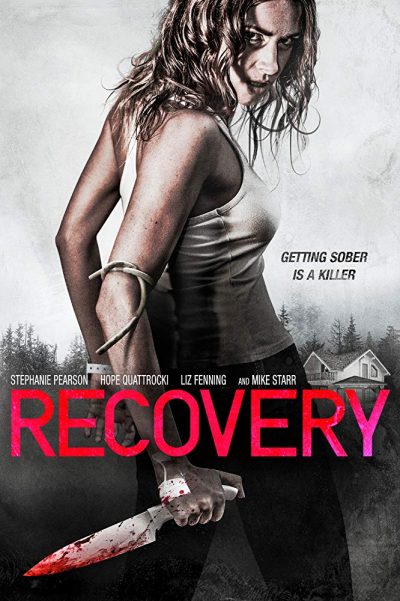★½
“PTSD might be preferable.”
 Dear god, this is tedious. It takes forever for anything to happen, and when it does, the impact is less than overwhelming. Ronnie Price (Pearson, occupying territory somewhere between Angelina Jolie in Girl, Interrupted and Michelle Rodriguez) is a former GI, suffering from PTSD after three tours in the Middle East, who took to “self-medicating” herself with heroin in an attempt to deal with what she went through. This doesn’t do too much for her anger issues, and after one brush with the police, she’s made to choose between prison and a spell in a remote, women-only rehab facility. Reluctantly, she chooses the latter, though it’s not long before her PTSD flashbacks kick in, and threaten to make her stay a brief one.
Dear god, this is tedious. It takes forever for anything to happen, and when it does, the impact is less than overwhelming. Ronnie Price (Pearson, occupying territory somewhere between Angelina Jolie in Girl, Interrupted and Michelle Rodriguez) is a former GI, suffering from PTSD after three tours in the Middle East, who took to “self-medicating” herself with heroin in an attempt to deal with what she went through. This doesn’t do too much for her anger issues, and after one brush with the police, she’s made to choose between prison and a spell in a remote, women-only rehab facility. Reluctantly, she chooses the latter, though it’s not long before her PTSD flashbacks kick in, and threaten to make her stay a brief one.
Before she can be expelled and handed back to the authorities, a blizzard conveniently settles in to the area, cutting the remarkably understaffed clinic off. Then, some of the other residents start turning up dead, and Ronnie’s history of violent rages makes her the prime suspect for the attending physicians, Dr. Barnes (Quattrocki) and Taylor (Starr). With no help from the outside, she’s going to have to prove her innocence, and also use her military skills to protect the rest of the patients from the real killer.
Some credit is probably due – presuming this was a deliberate choice, at least – to both director and lead actress, for making the heroine thoroughly unlikable. When we first meet, Ronnie she’s not a nice person at all, with no apparent interest in getting clean, and only there at all because it seems easier than the alternative of jail. The main problem is, Ronnie never seems to develop from that point. There’s no sense of her coming to terms with her situation and resolving to be a better person, or rising above her issues to acts of heroism and valour.
Instead, it feels as if the audience is supposed to empathize with Robbie, simply because she’s being falsely accused of murder. She can’t even be sure of her own innocence, due to the blackouts. She certainly still isn’t a nice person, and there is hardly anyone else in the film capable of eliciting any empathy from the audience: Dr. Barnes perhaps comes the closest, though she too has her problems. After being largely a dull, druggie drama for the first hour (how many group therapy sessions do we need to see?), it shifts genres for the final third, and becomes a slasher film.
Unfortunately, Liang seems to have no experience of, or expertise with, the horror genre. This would explain why the last act descends into little more than a series of uninspired cliches, Ronnie and the women creeping around the poorly-lit corridors of the hospital and doing battle. I did find slight interest in the realistically brutal approach to the violence: when the “heroine” [quotes used advisedly] administers a beatdown, it feels like the kind of thing a borderline psychotic ex-soldier might do. But as a whole, the cover is a far better film, than the film actually is.
Dir: John Liang
Star: Stephanie Pearson, Hope Quattrocki, Liz Fenning, Mike Starr




